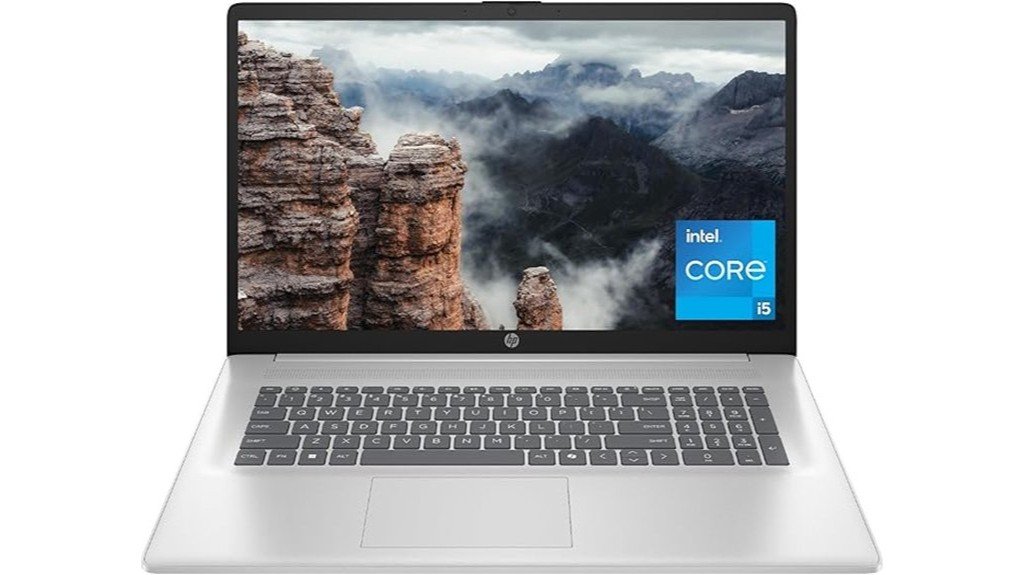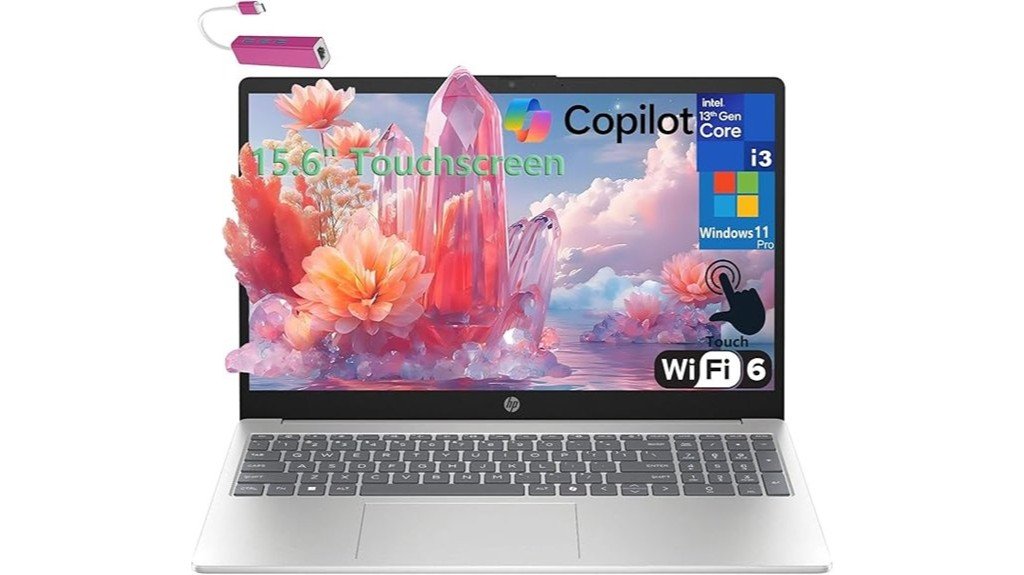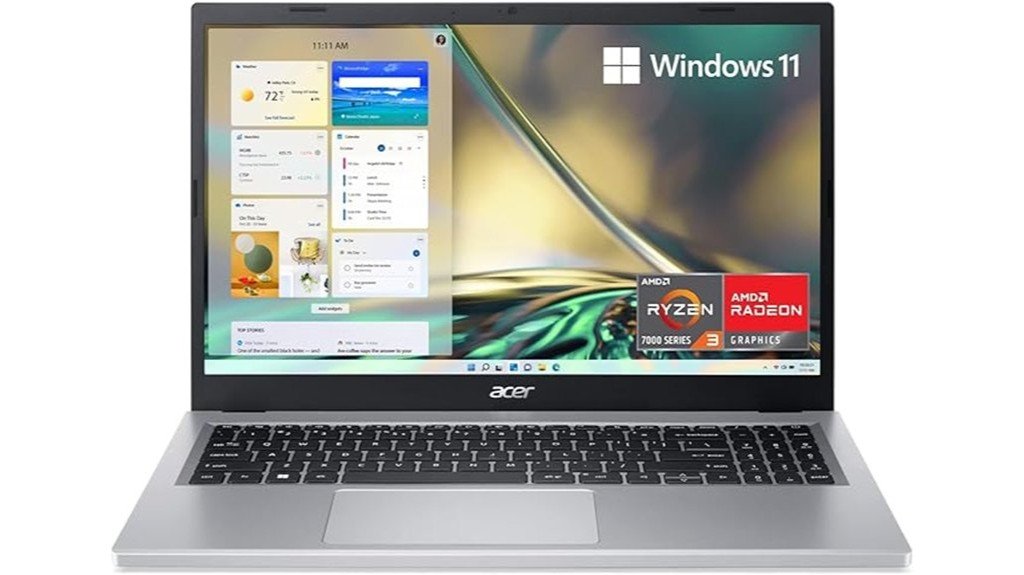For 2025, consider the HP 17.3-inch Laptop for stunning visuals and fast performance, thanks to its Intel Core i5 processor. If portability is key, the HP Touchscreen Laptop offers 32GB RAM and a 1TB SSD, making multitasking a breeze. Alternatively, the lightweight Acer Aspire 3 provides solid performance with an AMD Ryzen processor and a bright Full HD display. Let’s explore the factors you should consider when choosing the perfect laptop for home use.
HP 17.3 inch Laptop (17-cn3399nr)

If you’re seeking a powerful yet budget-friendly laptop for home use in 2025, the HP 17.3 inch Laptop (model 17-cn3399nr) stands out with its impressive 17.3-inch FHD display and robust Intel Core i5-1334U processor. You’ll enjoy stunning visuals with the integrated Intel Iris Xe Graphics, perfect for gaming or creative tasks. With 16 GB of RAM and a 512 GB SSD, multitasking becomes seamless and lightning-fast. Plus, the laptop charges quickly, reaching 50% in just 45 minutes, and boasts a solid 8-hour battery life. This eco-friendly choice also comes with a one-year warranty, ensuring peace of mind.
Best For: Individuals seeking a powerful, budget-friendly laptop for home use, gaming, and creative tasks in 2025.
Pros:
- Impressive 17.3-inch FHD display for stunning visuals and wide viewing angles.
- Fast performance with Intel Core i5 processor, 16 GB RAM, and 512 GB SSD for seamless multitasking.
- Quick charging capability reaching 50% in just 45 minutes and an average battery life of 8 hours.
Cons:
- Larger size may not be portable for users who need a laptop on the go.
- Integrated graphics may not meet the demands of high-end gaming or professional graphics work.
- Limited warranty period of only one year compared to some competitors offering longer coverage.
HP Touchscreen Laptop Computer (15.6″, 32GB RAM, 1TB SSD)

The HP Touchscreen Laptop Computer stands out as an excellent choice for anyone seeking a powerful home computing experience in 2025, especially with its impressive 32GB of RAM and 1TB SSD storage. The 15.6-inch HD touch display enhances your viewing experience, while the 13th Gen Intel Core i3 processor guarantees smooth multitasking. With Wi-Fi 6 and Bluetooth 5.3, you’ll enjoy fast connectivity. The sleek design, weighing just 3.52 lbs, makes it portable. Plus, user-friendly features like the HP True Vision camera and stereo speakers elevate your experience. Overall, this laptop combines performance and convenience, making it perfect for home use.
Best For: Individuals seeking a powerful and portable laptop for home use, particularly for multitasking and media consumption.
Pros:
- High Performance: Equipped with a 13th Gen Intel Core i3 processor and 32GB RAM for smooth multitasking and efficient performance.
- Ample Storage: Features a 1TB SSD for fast data access and plenty of space for files, applications, and media.
- User-Friendly Features: Includes a touchscreen display, HP True Vision camera, and stereo speakers for an enhanced user experience.
Cons:
- Limited Battery Life: Users have noted concerns regarding battery performance during extended use.
- Keyboard Lighting Issues: Some feedback indicates problems with the keyboard lighting functionality.
- Basic Graphics: Integrated Intel UHD Graphics may not be suitable for high-end gaming or graphic-intensive tasks.
Acer Aspire 3 A315-24P-R7VH Slim Laptop

Looking for a laptop that balances performance and portability? The Acer Aspire 3 A315-24P-R7VH Slim Laptop is an excellent choice. Weighing just 3.92 pounds, it features a stunning 15.6-inch Full HD IPS display, perfect for work and entertainment. Powered by an AMD Ryzen 3 7320U processor and 8GB of LPDDR5 memory, it handles multitasking effortlessly. The 128GB NVMe SSD guarantees fast boot times, while Wi-Fi 6 keeps your connection stable. With an average battery life of 11 hours, it’s great for on-the-go use, though its audio quality could improve. Overall, it’s a reliable option for home use.
Best For: The Acer Aspire 3 A315-24P-R7VH Slim Laptop is best for students and professionals seeking a lightweight, reliable device for multitasking and everyday productivity.
Pros:
- Smooth performance for multitasking with the AMD Ryzen 3 processor and 8GB of memory.
- Fast boot and load times thanks to the 128GB NVMe SSD.
- Bright and clear 15.6-inch Full HD IPS display for an enhanced viewing experience.
Cons:
- Battery life may not be sufficient for full-day use without recharging.
- Average audio quality that may not meet all users’ expectations.
- Trackpad responsiveness could be improved for better usability.
Factors to Consider When Choosing Lapfor Home Use
When choosing a laptop for home use, you should consider several key factors. Display size and quality, processor performance, RAM capacity, storage options, and battery life all play a critical role in your overall experience. Balancing these elements will help you find the perfect fit for your needs.
Display Size and Quality
Choosing the right display size and quality can greatly enhance your home laptop experience. Opt for a larger screen, like 15.6 inches or 17.3 inches, to boost productivity and enjoy immersive media. A Full HD (1920 x 1080 pixels) resolution is essential for sharp visuals and clearer text, especially for tasks like graphic design or gaming. Look for IPS technology, which offers wider viewing angles and better color accuracy, perfect for sharing your screen or working on color-critical projects. A higher brightness rating, ideally above 250 nits, guarantees visibility in various lighting conditions. Finally, consider a touchscreen for added interactivity, though be mindful of its impact on battery life and the laptop’s overall weight.
Processor Performance
A high-quality display enhances your laptop experience, but the processor performance can make or break your productivity. When choosing a laptop, look for modern processors like Intel’s 13th generation or AMD’s Ryzen 7000 series, which deliver impressive speeds between 2.0 GHz and over 4.5 GHz. Multi-core processors are essential; a quad-core can handle several applications simultaneously without slowing down. Integrated graphics, such as Intel Iris Xe or AMD Radeon, are sufficient for everyday tasks and light gaming. Additionally, consider thermal management features to guarantee your laptop stays cool during intensive tasks. Finally, efficient processors can enhance battery life, offering you 8 to 11 hours of use on a single charge, perfect for home use.
RAM Capacity
For smooth multitasking at home, you’ll want a laptop with at least 8GB of RAM. This capacity is essential for everyday applications, allowing you to run multiple programs without experiencing slowdowns. If you frequently switch between tasks or engage in more resource-intensive activities like gaming or video editing, consider opting for 16GB or even 32GB of RAM. Laptops with 16GB can handle more applications simultaneously, providing a seamless experience. Additionally, pay attention to the type of RAM; DDR5 offers faster speeds and improved efficiency compared to DDR4. For most home users, sticking with 8GB to 16GB is sufficient, but power users might find 32GB beneficial for demanding software and applications. Choose wisely to guarantee reliable performance!
Storage Options
When it comes to selecting the right storage option for your home laptop, you’ll find that speed and capacity play essential roles. Opt for SSDs over traditional HDDs, as they offer boot and load times up to 15 times faster. If you plan to store a decent number of applications and files, aim for at least 256 GB; however, 512 GB or more is ideal for multimedia and larger software. Laptops with NVMe SSDs provide even better data transfer speeds than SATA SSDs, enhancing multitasking capabilities. For extensive storage needs, consider laptops with 1TB SSDs or additional HDD options. Finally, checking if the laptop allows for future storage upgrades can be beneficial for accommodating your growing data needs.
Battery Life
Considering how often you’ll use your laptop throughout the day, battery life becomes an essential factor in your decision-making process. Typically, laptops offer an average battery life of 8 to 11 hours, but higher-end models can provide even longer usage times, perfect for productivity or entertainment. A laptop with extended battery life lets you enjoy activities like video streaming or online gaming without the hassle of constant recharging. Fast charging capabilities are also worth considering; some models can reach 50% in just 45 minutes, minimizing downtime. Additionally, keep in mind the power consumption of the laptop’s components, like the processor and display technology, as they directly impact overall battery performance and usability. Choose wisely!
Portability and Weight
If you want a laptop that fits seamlessly into your home life, portability and weight are key factors to evaluate. Look for models that weigh between 2 to 4 pounds; these lighter options make it easier to move around the house or take with you. A design under 15 inches in width helps with easy storage on desks or in bags, while a slim profile, ideally under 1 inch thick, enhances convenience. Battery life is vital, so aim for at least 8 hours to keep you going without constant recharging. Finally, consider build materials like aluminum or high-quality plastics, as they offer a lightweight yet durable feel, ensuring your laptop can withstand daily use without sacrificing portability.
Connectivity Features
A solid connectivity setup is essential for any home laptop, especially as we rely more on digital tools. Look for laptops with Wi-Fi 6 (802.11ax) capabilities; they offer faster data transfer rates and better performance in crowded networks. Multiple USB ports are a must, so check for both USB Type-C and USB Type-A to connect various peripherals easily. Models equipped with Bluetooth 5.0 or higher will guarantee smooth wireless connections to devices like headphones and mice. Additionally, an HDMI port is beneficial for connecting to external displays, enhancing your productivity. If you need stable wired connections for activities like gaming or video conferencing, verify the laptop has an Ethernet port or comes with a bundled adapter.
Price and Budget
Establishing a clear budget range before diving into the laptop market is essential, as prices can vary widely based on specifications and features. Don’t just focus on the purchase price; consider the total cost of ownership, including accessories, software, and extended warranties. Research average prices for laptops that meet your specifications, noting that higher RAM and SSD sizes generally mean higher costs. Keep an eye out for seasonal sales or discounts, as many retailers offer promotions that can greatly reduce prices. Ultimately, find a balance between price and performance, ensuring the laptop you choose meets your home use needs without forcing you to overspend on features you won’t utilize.
Frequently Asked Questions
What Is the Average Lifespan of a Laptop for Home Use?
The average lifespan of a laptop for home use is around three to five years. Regular maintenance and upgrades can extend this, but you’ll likely notice performance declines as software demands increase over time.
How Much Storage Do I Really Need for Home Use?
They say, “Less is more.” For home use, you’ll generally need 256GB to 512GB of storage. This gives you ample space for documents, media, and software without overwhelming your laptop’s performance or your budget.
Can I Upgrade My Laptop’s Hardware Later?
Yes, you can upgrade your laptop’s hardware later, but it depends on the model. Check your laptop’s specifications and manufacturer guidelines to see if components like RAM or storage can be easily replaced or enhanced.
What Are the Best Brands for Home-Use Laptops?
When searching for a reliable home-use laptop, think of brands like Dell, HP, and Apple as your trusty companions. They offer excellent performance, durability, and customer support, ensuring you’re never left in the lurch.
How Do I Maintain My Laptop for Optimal Performance?
To maintain your laptop’s ideal performance, regularly update software, clean the hardware, manage storage, and avoid overheating. You should also run antivirus scans and consider using a cooling pad to extend its lifespan.
Conclusion
To sum up, whether you’re streaming your favorite show or crunching some numbers, these laptops have got you covered in 2025. With their powerful performance and reliable specs, you can’t go wrong. Just remember, while you’re scrolling through the latest memes, a solid laptop makes all the difference. So, grab one of these beauties and transform your home into a productivity powerhouse—no floppy disks required! Happy computing!
